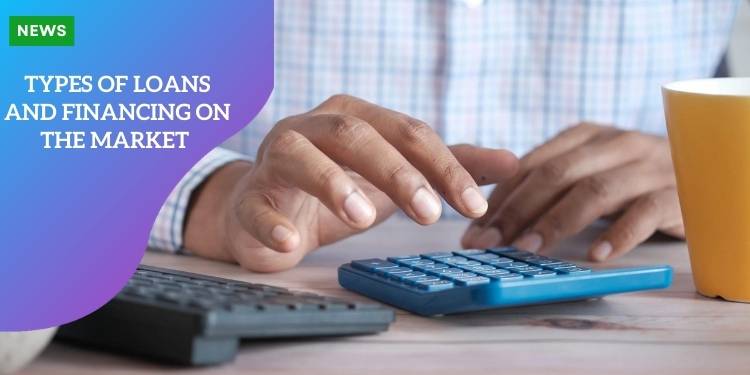Types of loans and financing on the market

Do you know and are familiar with the main types of loans available? In crisis situations, they can be extremely valuable, but it is imperative to take precautions to avoid accumulating debt and damaging your financial stability. After all, the strength of your personal finances depends on well-founded choices.
There are many reasons that may require you to seek a loan, such as outstanding debts, unemployment, the desire to join a certain enterprise or the acquisition of an asset or asset. However, before committing to signing and taking out a loan, it is essential and extremely necessary that you evaluate and investigate the options available on the market and select the one that best aligns with your needs and financial characteristics.
Are loans and financing always the best option?
In certain situations, seeking financing may reveal a viable alternative. This can be particularly useful for dealing with unforeseen financial situations or for achieving specific objectives, such as purchasing a vehicle or seeking investment capital.
However, the loan becomes an extremely negative alternative when the decision is not taken with due care, the risks of facing complications increase significantly, since obtaining a loan implies a substantial financial commitment, it is ideal that the process is analyzed carefully and has direction so that, consequently and subsequently, something concrete is chosen and formulated with a study of the financial situation and analysis of what can really help you, and not put you into debt.
Therefore, you must investigate and find out whether, in fact, this is the most appropriate option to meet your needs. It is also crucial to analyze whether the type of loan taken out is the most beneficial in terms of interest rates, payment term and installment structure. All these aspects require a thorough evaluation.
Personal Loans:
Personal loans are one of the most common forms of credit on the market. They do not disable warranties and can be used for any specific purpose, such as paying off debts, carrying out home improvements, going on a trip or covering unexpected expenses.
Generally, interest rates on personal loans are higher than other types of loans due to the lack of collateral.
Secured loans:
A secured personal loan has similarities to conventional personal credit, but with an additional element: it requires the provision of an asset as payment guarantee.
In this way, the functioning of the secured loan involves the offering of some good in exchange for confirmation of payment, serving as a type of security for the loan. Such assets can be seen and considered as real estate and vehicles. In case of default, the asset in question may be permanently transferred to the possession of the institution that granted the loan.
Payroll loan:
The payroll loan is a loan format that stands out for the automatic deduction of installments directly from the borrower’s payroll. This type of loan is granted mainly to INSS beneficiaries, public employees and employees of companies that have agreements with financial institutions.
Furthermore, what makes the payroll loan a low-risk option is the fact that payment of the installments is practically guaranteed, as it happens automatically on the borrower’s payroll. Consequently, the interest rates associated with this type of loan are among the lowest on the market.
However, there are limits and conditions that must be applied to taking out a payroll loan, such as:
- The value of the installments cannot exceed 30% of the borrower’s salary, ensuring that a significant part of their income is still available for essential expenses.
- Authorization for payroll deduction must be expressly provided at the time of taking out the loan.
- It is important to highlight that, in some cases, the borrower may not have the possibility of paying installments in advance, or that this may be a disadvantage for those who want to get out of debt more quickly.
Therefore, when opting for a payday loan, it is essential to carefully evaluate the conditions and terms to ensure they meet your financial needs and payment goals.
Revolving Loan:
The revolving loan is a concept that is extremely recognized by those who use credit cards. This mechanism works as a type of financing for the card bill and is activated automatically when the customer does not make full payment of the amount due.
In short, the bank assumes the unpaid difference, however, the revolving loan results in substantial financial charges in subsequent months. Even though this method avoids the immediate inclusion of the customer’s name in credit protection services, it is extremely important to remain vigilant. Otherwise, it is possible to lose control of your debt and significantly harm the health of your personal finances.
Overdraft:
Did you know that overdraft represents a loan category? This type of credit works as a pre- established limit of resources available in your bank account. Consequently, when the balance reaches a negative level, the overdraft is automatically activated.
It is worth mentioning that the financial charges associated with checking the special variation depend on the period in which you use this modality. Unfortunately, many people end up accumulating substantial debt and facing challenges when trying to negotiate this debt, as it can become significantly burdensome.
Recently, there has been an implementation of new regulations and requirements related to special verification, including:
- Limiting the interest rate to 8% per month.
- The imposition of a fee of 0.25% per month for the availability of resources in addition to R$500 in the special check.
In short, the lending landscape is full of opportunities and alternatives designed to meet individual financial needs. For this reason, the choice and selection of the most appropriate loan is relatively linked to the individual’s motivation and the financial conditions at stake, predominantly considering the applicant’s finances and the economic situations involved in each situation.







